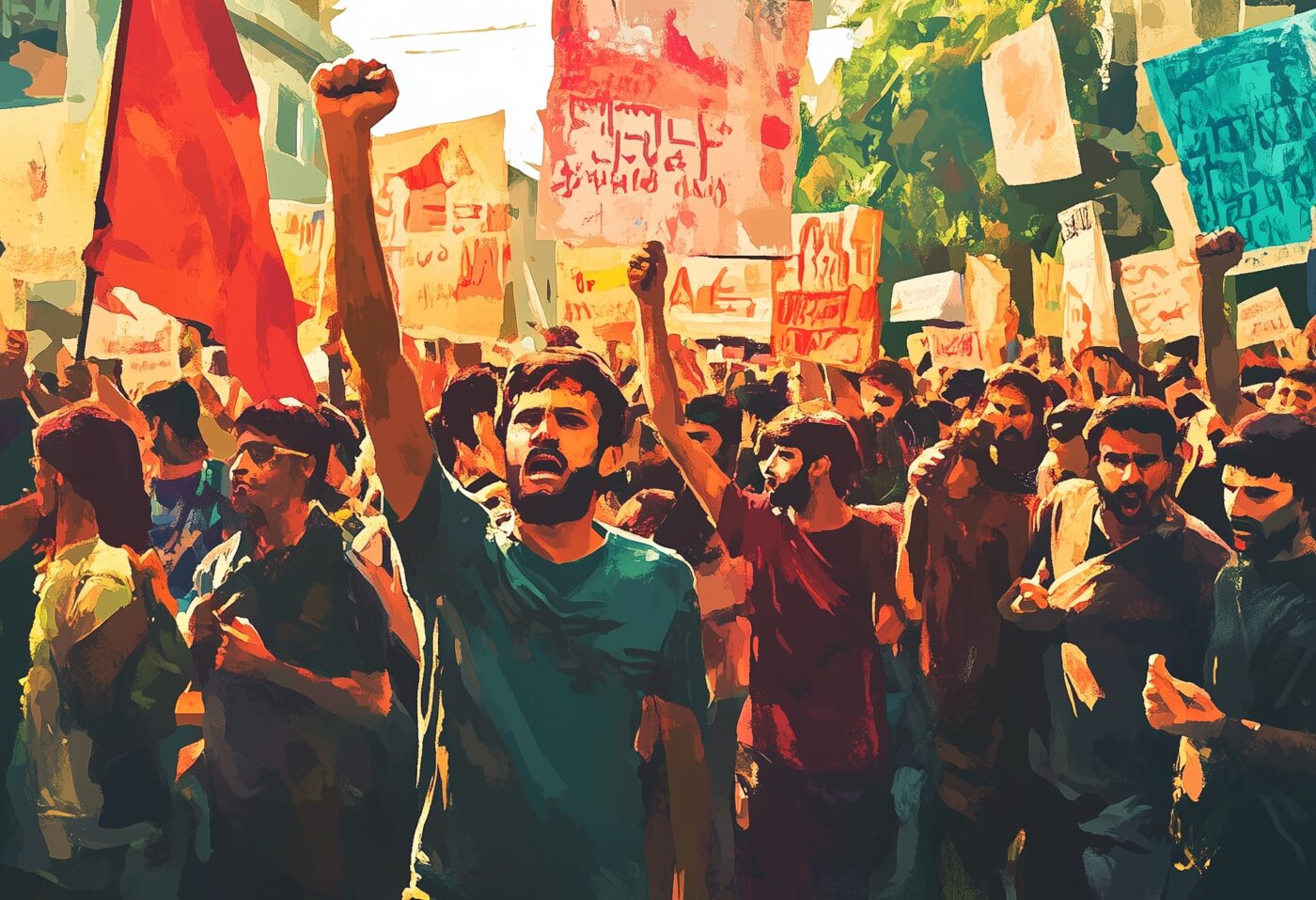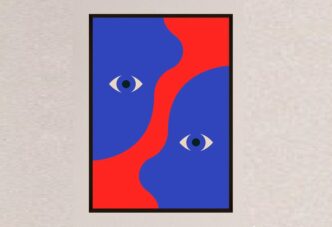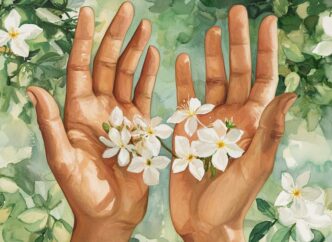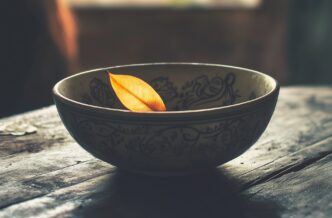Physically, Imran was at the government-sponsored event at the convention center. Mentally, he was at Shahbagh.
Officials took turns at the podium, their speeches booming through loudspeakers scattered around the venue. They spoke about a country united by shared values and common goals, a nation rich in diversity but focused on one purpose.
And the current speaker was his father.
As Imran’s distinguished-looking father, with a salt-and-pepper beard and glasses, took the stage, the crowd erupted into thunderous applause. After waiting for the noise to die down, he began his speech: “Dear friends, fellow countrymen and women, and most importantly, our future generations,” he bellowed. “Today, I speak of the great strides our nation has taken under our wise and capable leader.” The audience cheered and raised their fists in agreement. “Under her guidance, our country has blossomed into an oasis of progress and unity,” he continued. “Skeptics once claimed this was impossible, but look around you now! Look at the united faces of your neighbors from every corner of this land.”
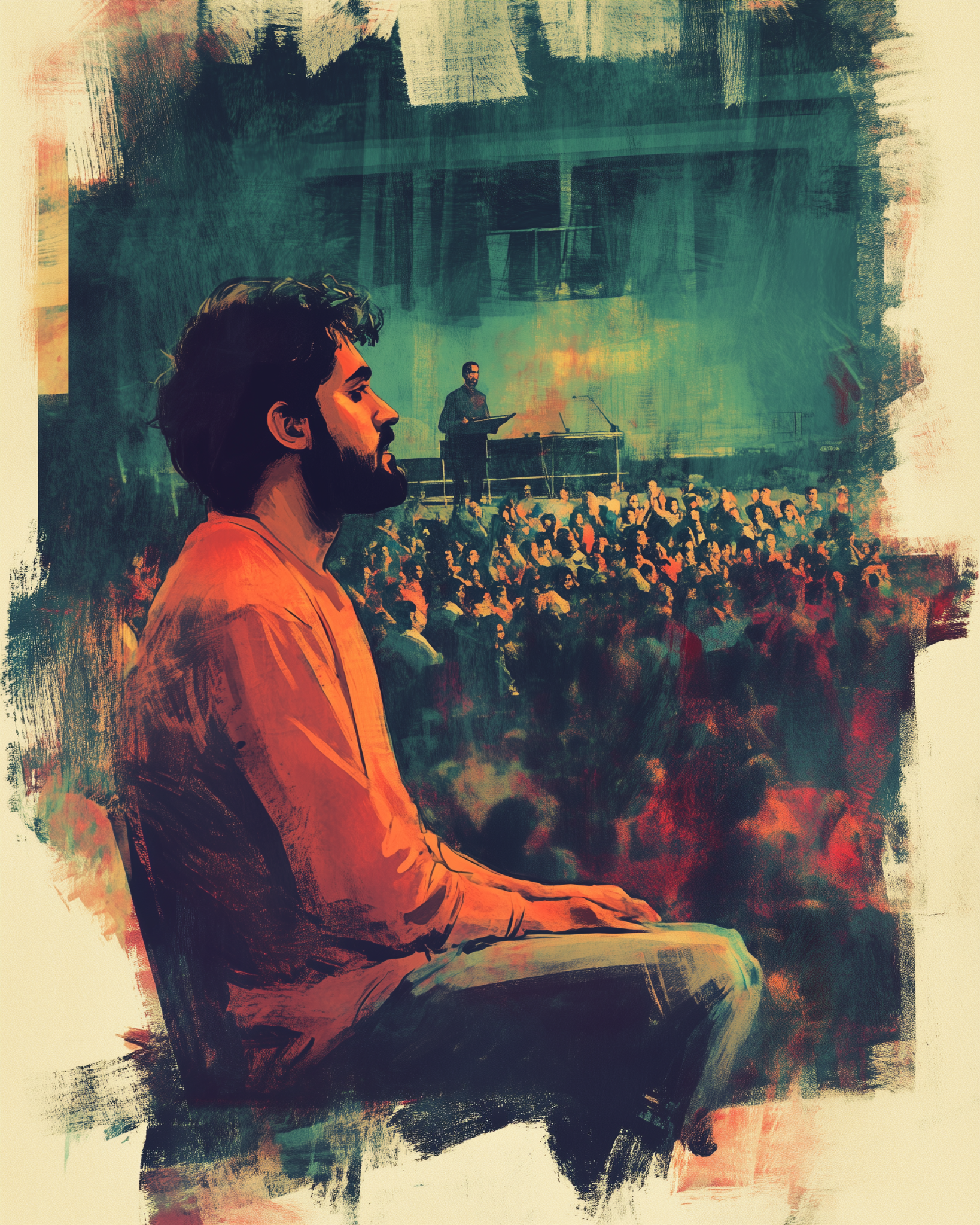
The crowd roared as he spoke, their voices merging with the echoes of his powerful words. “But we must not become complacent,” he cautioned, his tone shifting to a somber one. “There are those who would undermine our hard-won peace and stability. They prey on the naivety of our youth, stirring up discord in our streets.” He paused, scanning the enraptured audience.
“Do you remember the days of chaos? Bombs, death, and fear were rampant. We do not want those dark times to return,” he solemnly reminded them. “But there are some who threaten our hard-earned progress.” He shook his head in disappointment.
A murmur spread through the crowd, memories of past chaos and anarchy causing unease. It was a reminder of why they appreciated their strong leader.
As Imran listened to his father’s speech, he felt a disconnect from the applauding audience and the harsh realities of the world outside. The students protesting for justice seemed to inhabit a different universe. Imran wondered why he stayed in this world of wealth and fakeness, held back by his father’s stern gaze. Was it fear that stopped him from joining the fight? The question plagued him.
He struggled with doubt. Would their demands for change make a difference? He remembered the protests from two years ago, which were brutally suppressed. Their optimism was crushed by those in power, and all they received was a minor delay – a tactic to avoid addressing the root issue.
“But do not fear,” Imran’s father reassured, raising a hand in the air. “The party will always protect what is most important to us: peace, unity, and our future.” The audience erupted in applause once more, drowning out any doubts. Imran joined in half-heartedly.
He couldn’t help but think of the people at Shahbagh, braving the heat and the rain, demanding their voices be heard. They weren’t terrorists or anarchists; they were students, artists, and ordinary citizens like him who longed for a better future.
A future where their voices mattered and their dreams weren’t crushed under the boot of oppression.
As his father finished his speech to a standing ovation, Imran slipped away, apologizing as he moved through the crowd. He needed to return to Shahbagh and the movement that brought him hope and passion, unfazed by hollow words and nationalism.
He hailed a rickshaw and directed the driver to Shahbagh. The streets were bustling with people going about their evening routines, vendors selling all sorts of items. Underneath the surface of their everyday lives, turmoil brewed.
Imran’s faith in the government and his father was eroding. As a child, he believed every word his father said and saw textbooks as infallible guides to the world. But recent years shattered this trust. Imran’s peers were terrified of the government’s iron grip and strict mandates. The unspoken rule was to follow obediently or risk unpredictable consequences.
Reaching Shahbagh felt like coming home. The air was charged with a mix of determination, defiance, and camaraderie, creating an unusual tension. The people’s expressions showed extreme emotions, from blazing anger to fear and nervousness. Emotions ran high, nerves stretched thin and hearts racing.
Imran joined Rashid and Alia nearby, where Rashid led chants that echoed through the square. Meanwhile, Alia livestreamed the demonstration on social media, trying to hide her trembling hands and keep a brave face for her audience. But Imran could see her fear was just as strong as everyone else’s.
He approached her, placing a gentle hand on her shoulder. “Hey,” he said softly. “How are you holding up?”
Alia turned toward him, pausing the stream. She managed a weak smile. “I’m doing okay. Just a bit shaken up, I guess.” Her voice trembled slightly.
Imran squeezed her shoulder reassuringly. “What happened?”
Alia’s breath hitched in her throat. “They killed someone. In Rangpur. He stood in front of the police with his arms outstretched. And they pelted him with rubber bullets. He died from a massive internal bleeding.” Her eyes brimmed with tears, her lips quivering.
“I’m so sorry,” Imran murmured, wrapping his arms around her in a hug. She buried her face in his chest, her shoulders shaking as she cried.
Alia’s voice, thick with emotion, faltered as she tried to form coherent sentences. She was fighting back tears, but her sobs broke through anyway. “This… this takes me back,” she stuttered, wiping the tear tracks from her face before continuing. “Three years ago… my brother… they took him away.”
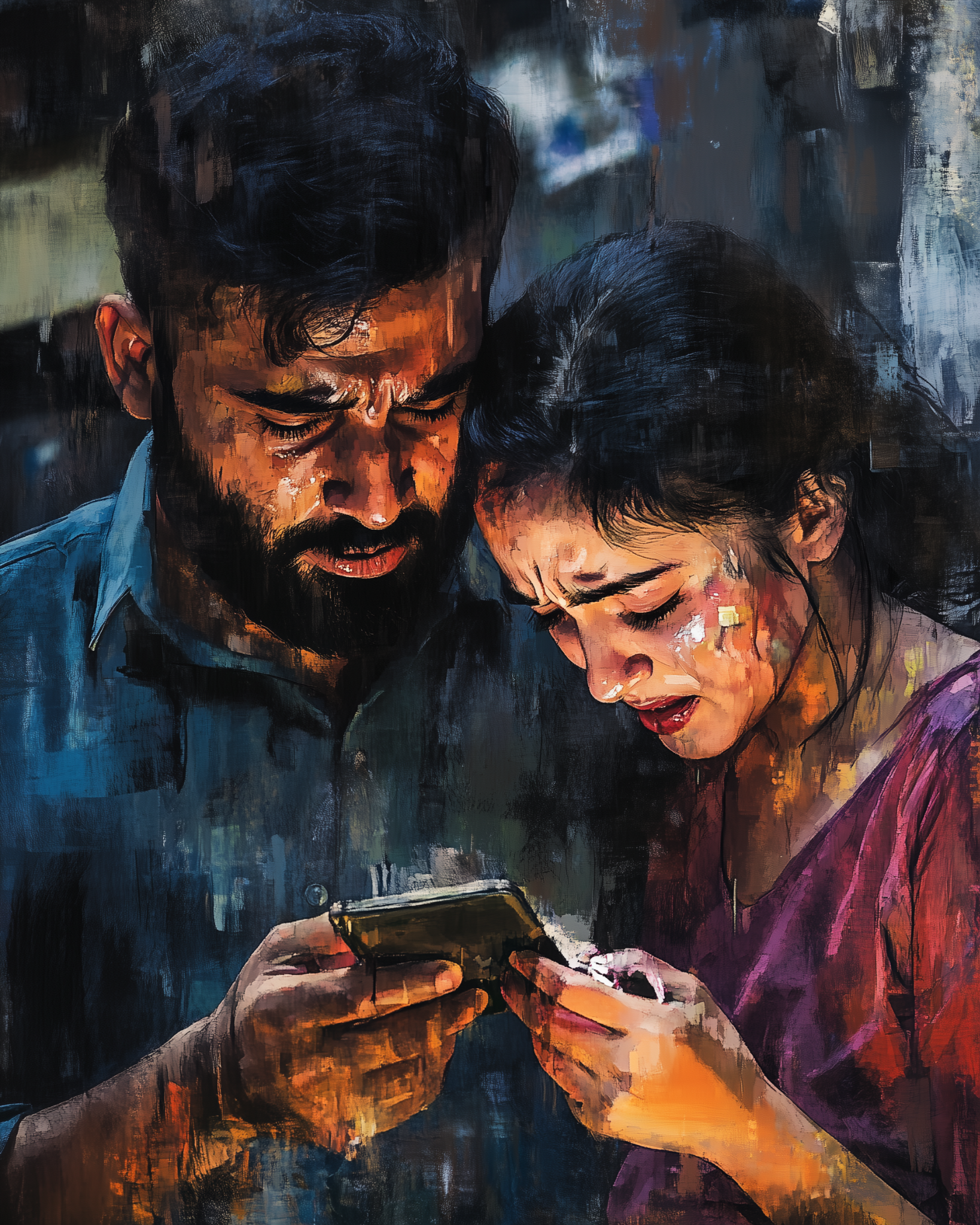
Her words wavered with the weight of the memory. Between ragged breaths, Alia managed to say, “The police took him in for questioning.” Her eyes had a distant look as she recalled those harrowing four days when her brother was gone. When he returned, he was physically damaged and mentally scarred – a mere shadow of who he used to be.
“The next day…” Alia paused momentarily to steady herself before resuming. “They branded him a militant troublemaker from an Islamic student group.” A dry chuckle slipped past her lips at the ridiculousness of it all.
And that’s partly why Alia stood here now, Imran supposed – expressing her outrage through protest. The wrong done to her brother ignited a passion in her to stand up against such acts of injustice. This wasn’t about more than protesting; it was about demanding justice and standing up for what she believed in.
Imran held her close, his heart aching for her and the young man they had lost. As she played the video, his hands clenched and his face twisted in anger. He glanced between the screen and her before turning away, overwhelmed with emotion.
The footage rolled on, each replay plunging him into doubt. His thoughts whirled with confusion as ghostly images echoed in his mind.
His eyes glued to the screen, fingers trembling over the screen. Play, pause, or stop? Each viewing felt like a gut punch, leaving him breathless and tangled in disbelief.
His instincts urged action but he remained frozen in indecision.
Rashid must have noticed him, because the next thing Imran knew, Rashid was nudging him towards the divider and calling for a nearby tea hawker.
Imran drank from the cup, feeling some relief in his raw nerves. His strength returned and his mind cleared. He glanced at his fellow protesters, seeing their mirrored expressions: determined yet fearful.
“Today is the day,” Rashid said, his voice full of conviction and simmering fury. Imran nodded, but doubts plagued him as he faced uncertainty.
Rashid noticed this too. “I know it’s scary,” he said, his voice softening. “But we have to stand together and show the world we won’t be silenced by their lies. We can’t let them bury us.” He paused, placing a hand on Imran’s shoulder. “If we don’t do this, who will?”
The question hung heavy in the air, a challenge and a plea wrapped up in one.
Imran swallowed, the weight of responsibility bearing down on him. “It’s easy for you,” he said. “Your father is from the opposing party. My father-”
Rashid interrupted, “It’s not about our fathers. It’s about our future and the freedom we want for our country. A future where we can live without fear of being taken away in the night, never to see our loved ones again. A future where speaking out against injustice won’t cost lives.”
Imran nodded. “Of course, I do.”
“Then stand with us,” Rashid said, his voice filled with conviction. “We’re stronger together than we are apart.”
Imran took a deep breath, letting the air fill his lungs, steadying himself. “Give me some time to think about it.”
Rashid’s expression was solemn. “We don’t have much time. You’ll be forced to choose, sooner or later. And when that time comes, I hope you’ll make the right choice.”
Imran wasn’t sure he could.
That night, he returned home late, exhausted and troubled. As he walked through the front door, his father called out to him.
“Where were you?” his father asked, a hint of concern in his voice. “I was worried.”
Imran forced a smile. “Don’t worry, Dad. I’m fine. Just…taking care of some stuff.”
His father gave him a long look, his gaze piercing. “Are you sure you’re okay?”
Imran nodded, not trusting himself to speak.
His father sighed, running a hand over his beard. “Look, I know you’re worried about your friends. I know they’re probably at Shahbagh right now. Have you tried convincing them to back down? For their own safety?”
Imran’s jaw clenched, his fists curling at his sides. “They’re not doing anything wrong. They just want a fair shot, a chance to live their lives without being afraid of the government coming after them.”
His father’s expression was sympathetic, but his words were firm. “I understand that, but they need to realize that it’s not safe. They’re playing a dangerous game, and sooner or later, they’re going to get hurt.”
Imran wanted to argue, but the tiredness had seeped into his bones, weighing him down. He nodded, avoiding his father’s eyes.
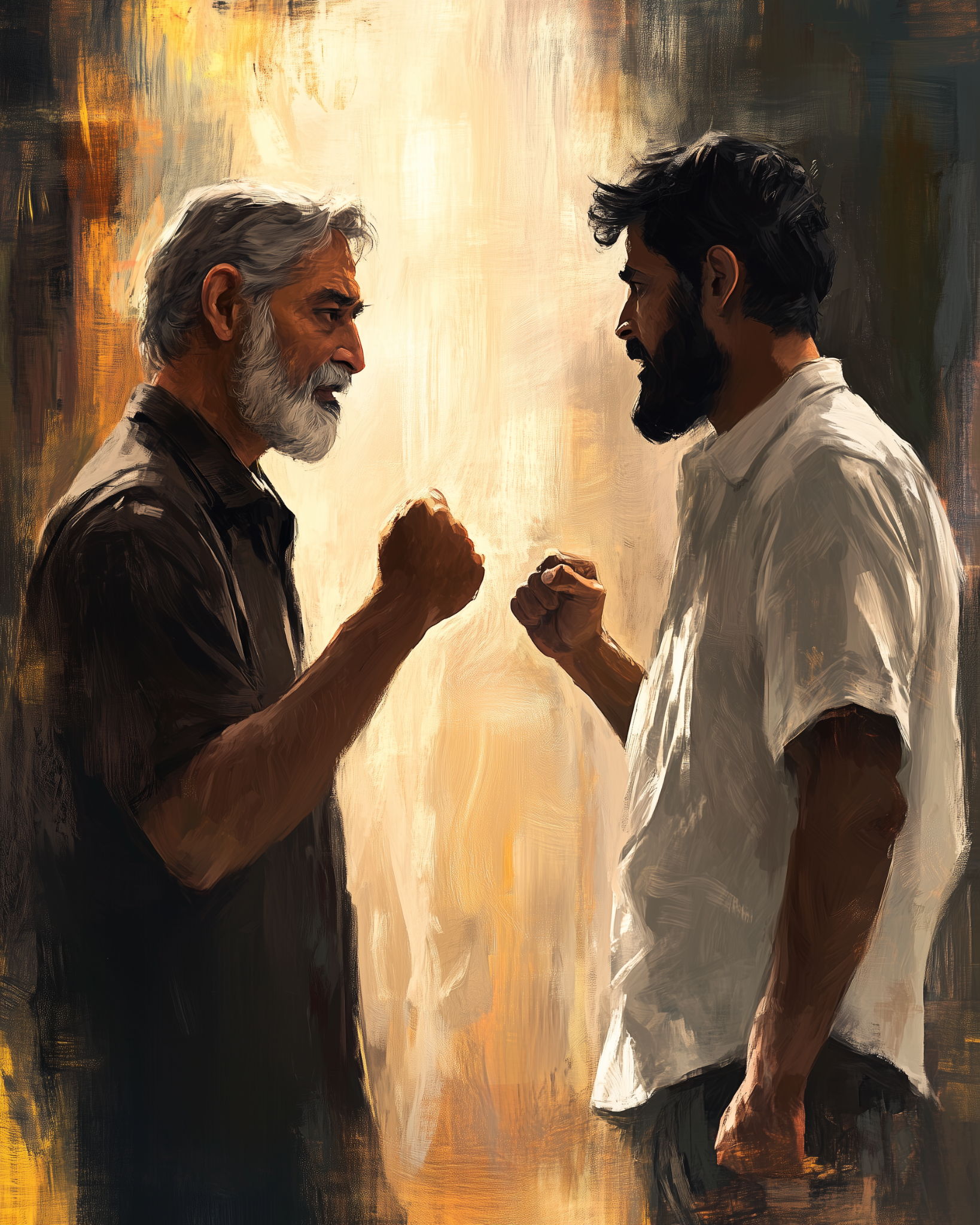
Imran’s father, his voice heavy with resignation, began to speak. “This is Bangladesh, son,” he said, eyes hardened by years of experience. “Here, power isn’t a matter of justice or fairness. It’s about strength and force.”
“The government,” he continued, his tone somber and steady, “holds all the aces here. They’re the dealer in this high-stakes game we call life.” His gaze met Imran’s, unflinching and resolute.
“And the things they can do to those who dare to protest…” His voice trailed off as if lost in some dark memory. He shook his head slightly as if trying to dislodge the thought. “You can’t even begin to fathom it, Imran.”
“Go get some sleep,” his father said, his voice gentle. “It’s been a long day for everyone.”
Imran trudged to his room, the gravity of his situation weighing heavily on him. His father was right: this was a dangerous game. But what choice did he have? To sit by and watch his country fall into tyranny and oppression? That night, he couldn’t sleep as thoughts of loved ones and his country raced through his mind.
As the first rays of sunlight filtered through the curtains, Imran finally made a decision.
He couldn’t stand by any longer.
He had to take a stand.
He had to join the movement.
Early that morning, he had learned that five more people had died yesterday. Including Mughdho, another master’s student like Imran himself, who was shot while carrying water bottles for protesters. Imran didn’t know what to do. The country was crumbling, and he was powerless to stop it.
That afternoon, Imran was leaving for Shahbagh again, but his father stopped him. “Son, where are you going? It’s dangerous there. I thought I told you not to go.”
“Abba, I have to. You don’t understand, those people are my friends.”
“And I’m your father,” he said, his tone stern. “As your father, I’m asking you not to go.”
“I can’t be like you, Abba. I can’t stand by and watch innocent people being killed, I can’t stand by and let the government silence everyone who disagrees with them.”
His father’s face hardened. “Those are dangerous thoughts, son. You don’t know what you’re talking about.”
“No, you don’t know what you’re talking about!” Imran said, his frustration boiling over. “You’re just like them, you’re a part of the problem! You’re part of the system that’s destroying this country!”
His father’s expression grew thunderous. “That’s enough, Imran! I’m your father, and you will not disrespect me like this.”
“I’m sorry, Abba,” Imran said, his voice low. “But I have to go. My friends are there, and they need me.”
“And if you die out there, who will take care of your mother and me?”
Imran’s heart twisted in his chest. “You don’t have to worry about that, Abba. I’ll be careful.”
His father’s expression softened. “Please, son. For my sake, don’t go.”
“I’m sorry, Abba.”
Imran’s father leveled a penetrating glare at him, his eyes weighted with silent blame. “I may have sided with the government, but it was for our family,” he said, his voice heavy with emotion. “I’ve spent countless sleepless nights worrying about your safety.”
Imran countered, “If that were true, you wouldn’t be sleeping so peacefully every night.”
“Please, just stay. At least for today.”
Imran’s heart ached, but he knew he had to do this. “I can’t.”
He walked past his father, ignoring his protests, and headed out the door.
On the way to Shahbagh, his mind was flooded with guilt and fear. Guilt for hurting his father and fear of the unknown. What would happen if he got caught? Would they torture him? Kill him?
But more than anything, he felt a deep sense of resolve. He was doing the right thing, and no matter what happened, he knew that his friends and the people at Shahbagh needed him.
Imran walked into Shahbagh. The air was heavy with a mix of feelings. A crowd had gathered, mourning the dead from the previous day’s violence. Tension stretched across the square, ready to snap. It smothered the crowd but beneath it was a steely resolve that wouldn’t be silenced.
Imran spotted Alia and Rashid in the crowd, standing together. Their faces reflected the same grief and defiance that filled Shahbagh today.
He joined them, stepping into their shared sorrow and determination like joining a river’s current. It replaced his initial fear with something stronger – unity.
Together, they stood strong.
As the day wore on, the atmosphere in the square became increasingly charged. People shouted slogans, their voices rising above the din of traffic. Police cordoned off the area, their eyes fixed on the crowd.
Imran’s heart pounded in his chest, adrenaline coursing through his veins. The energy was infectious, and he found himself swept up in it, shouting alongside his friends and the others in the crowd.
The police line moved forward, attempting to disperse the crowd. People shoved back, chanting louder. The standoff intensified, and the tension grew palpable.
Suddenly, a scuffle broke out between the police and some protesters. The situation quickly escalated, and a stampede erupted.
Imran was caught in the chaos, buffeted by the crush of bodies. He was swept along, helpless to resist the tide. People pushed and shoved, desperate to get away. Panic reigned supreme, and the air was filled with screams and shouts.
In the midst of the confusion, Imran caught sight of Alia. She was trapped, pinned against a wall by the surging crowd. Her eyes were wide with terror, her face drained of color.
Imran fought his way through the crowd, pushing and shoving to reach her. He grabbed her arm, pulling her away from the wall and into the safety of his embrace.
They clung to each other as chaos swirled around them. The police line was giving way and the protesters were advancing, tension reaching a breaking point.
Imran’s heart raced and his senses sharpened as he held the girl in his arms.
“It’s okay, I’ve got you,” he whispered, holding her close. “I’m not going to let anything happen to you.”
The crowd jostled and surged around them, but Imran stayed steady, anchoring them both in the chaos.
“Thank you,” Alia breathed, her voice trembling. “I was so scared.”
“I know,” Imran said, his arms tightening around her. “But we’re going to be okay. I promise.”
In the chaos, Imran saw people surging through the crowd, armed with sticks, wearing helmets. It was the government’s student wing, and they were here to attack.
Imran’s blood ran cold. He had to get Alia out of here.
He gripped her hand, pulling her behind him as he pushed through the crowd. He could hear the student wing getting closer, their shouts and jeers echoing through the square.
They had to find a way out.
Imran’s eyes scanned the chaos, looking for an escape route.
And then, in the corner of his eye, he saw it.
A small gap in the barricade, big enough for them to slip through.
“Come on,” he yelled, pulling Alia towards the gap.
They squeezed through the gap, just as the student wing reached them.
Adrenaline surged through Imran as he sprinted, the streets echoing his frantic steps. Ahead loomed an open square, devoid of cover. Every stride was a risk in this perilous battlefield, but he ran with determination. His heart pounded and fear weighed on his tongue like metal.
Desperately seeking shelter, he ran towards any hint of shadow – an alleyway or doorway that could provide a brief respite from the unyielding pursuit. Eyes followed him, some curious, others filled with fear or judgement, but no one dared to intervene.
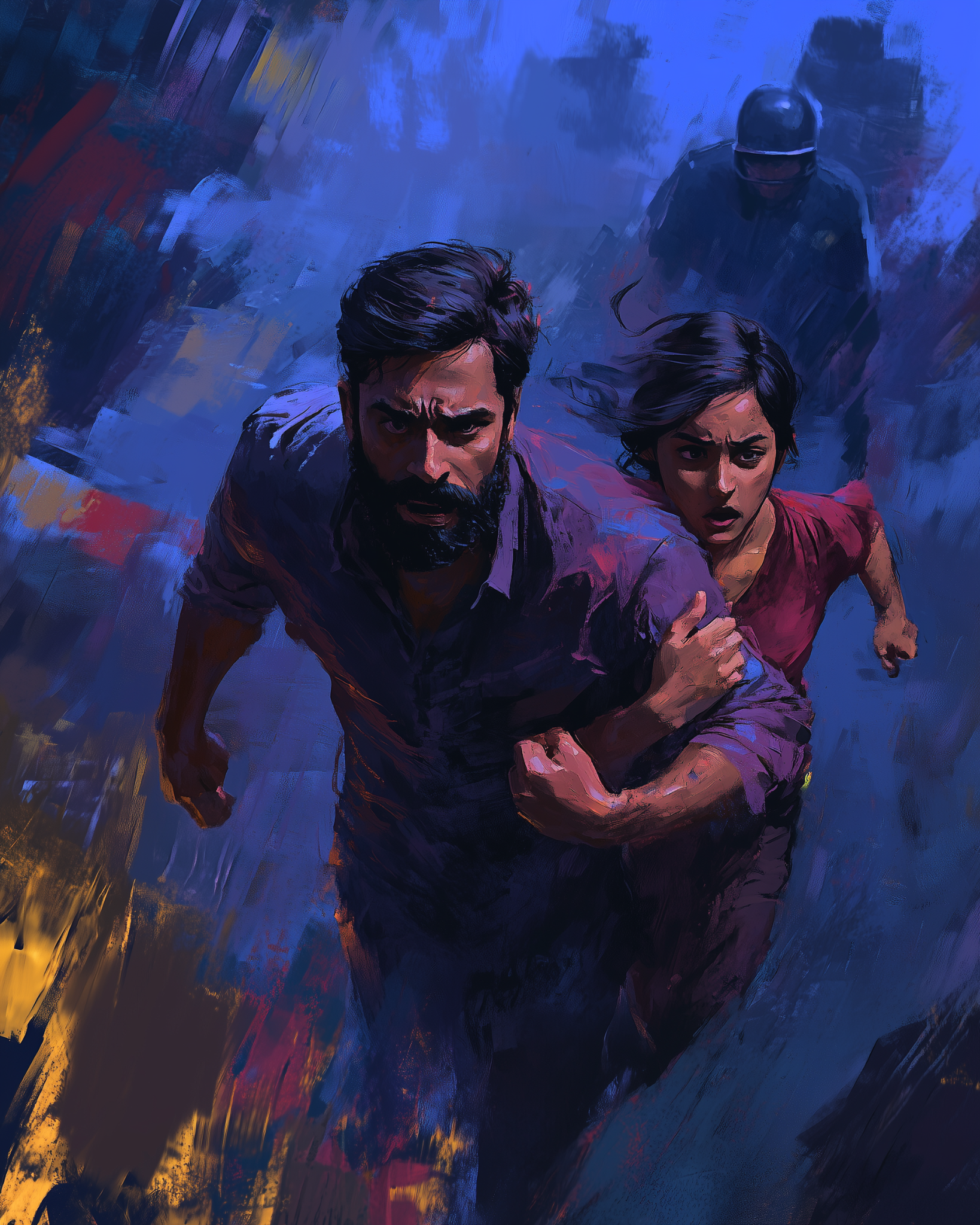
Imran and Alia narrowly escaped police batons and student wing goons time after time, like water slipping through fingers. But the relentless pursuit made it seem like the enemy was always close behind no matter where they fled.
Imran felt a stray blow or two hit his back, but the pain was a distant sensation – a dull throb that barely registered amidst the chaos of his flight.
Imran and Alia’s luck ran out as thugs caught up to them, their cruel intentions evident in menacing smiles. A muscular woman grabbed Alia and dragged her away, while two others attacked Imran with hockey sticks.
He was bombarded with sticks, unable to defend himself against the onslaught. In a moment of desperation, he considered revealing his father’s identity for protection.
But he refused to degrade himself in such a way and stayed silent.
But the thought of Alia alone with those thugs haunted him. With all his energy, he got up and charged at them once more.
Alia returned just in time, wielding a hockey stick she’d taken from one of the female thugs. With a loud yell, she hit one of Imran’s attackers.
Imran found hope in the unexpected turn of events. He overpowered his attacker and quickly escaped with Alia, tightly holding her hand as they ran into the city streets again.
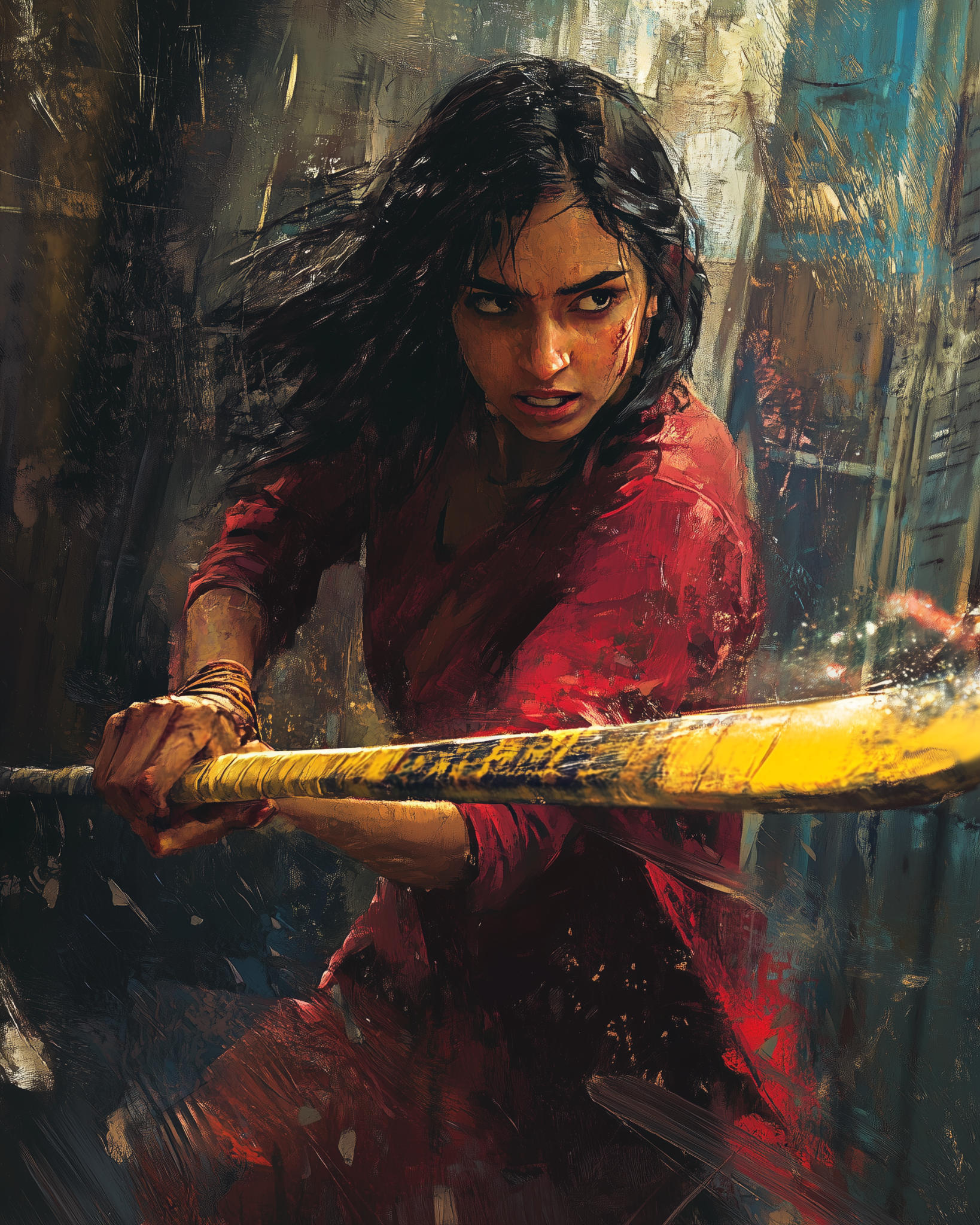
They escaped their pursuers and collapsed against a crumbling wall in a dilapidated alley, gasping for air. Imran looked at Alia, who was also slumped against the wall, breathing heavily.
“Are you alright?” Imran asked, concern etched on his face.
Alia nodded, wiping the sweat from her brow. Her temple was bleeding.
Imran pulled his kerchief from his pocket, handing it to her.
She pressed the cloth to her head, wincing slightly.
“We have to get out of here,” Imran said, his voice trembling.
Alia nodded. “I know.”
They stood up, taking a moment to catch their breath. The alley was eerily silent, save for the distant sound of sirens and shouts.
“Let’s go,” Imran said, taking Alia’s hand.
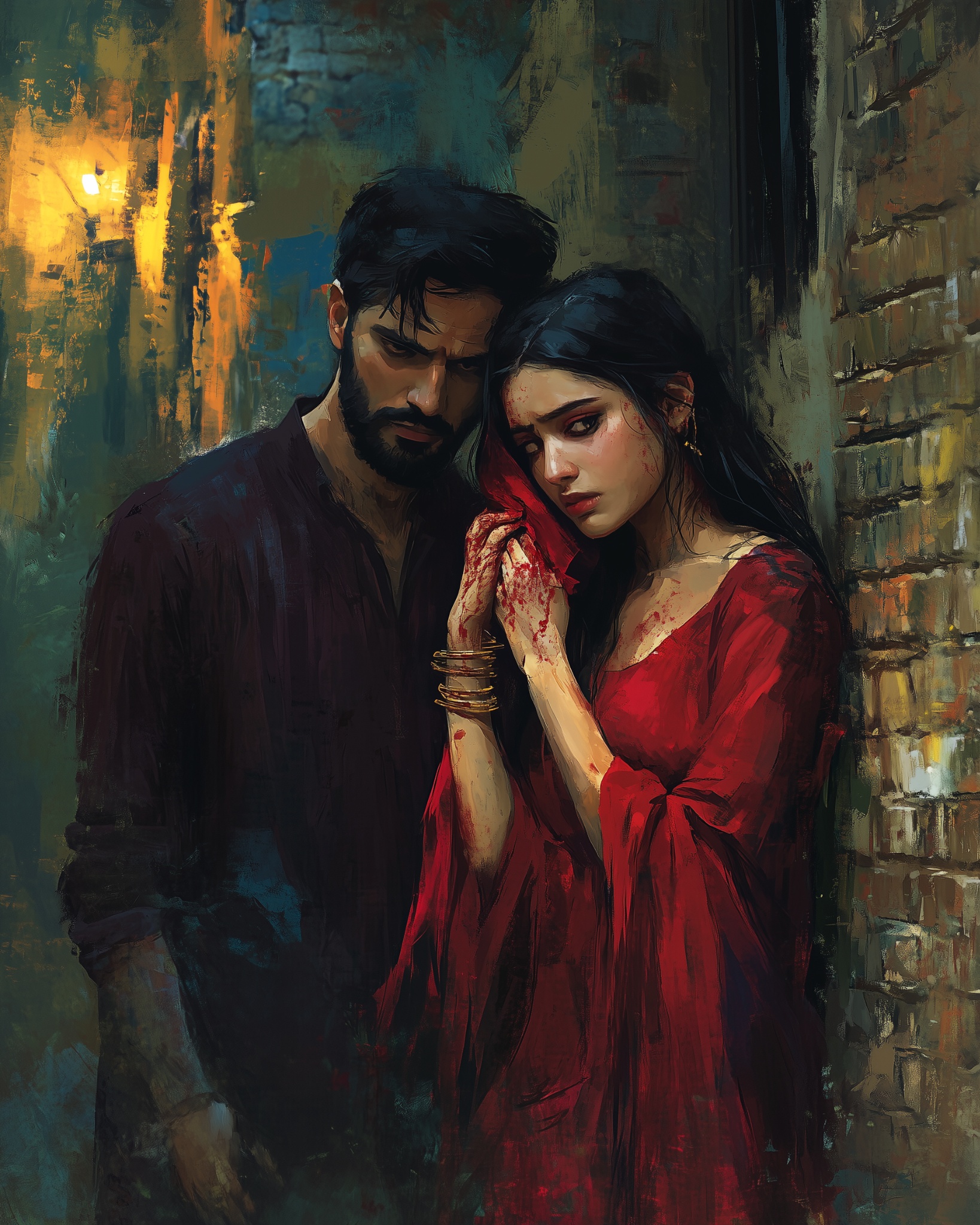
Imran didn’t go home that night. He and Alia went to a friend’s house instead. They spent the night in a basement, huddled together under blankets, waiting for the sun to rise.
In the morning, the news was grim. There had been deaths and injuries in the streets, but the numbers were unclear.
Imran turned on his phone. A message from his mother.
“Please come home. We’re worried about you. We love you.”
Imran didn’t respond. He looked at Alia.
“What do you want to do?”
“I don’t know,” Alia said. “This is all so crazy.”
“It’s not over,” Imran said. “They’re still out there.”
“I know,” Alia said. “We can’t let them win.”
Imran and Alia sat in the basement, their fingers entwined. The silence was deafening, and the fear was palpable.
Imran reminisced about the day he met Alia. She was unassuming at first glance, but there was a spark in her that demanded attention. As their bond grew, Imran saw her hidden vigor transform into something formidable. She channeled this energy to discover her calling and challenge the government’s actions.
Alia found her calling in journalism, a field that didn’t promise financial rewards in Bangladesh. She was not driven by money or power, but by the desire to amplify silenced voices and hold those in power accountable. Despite facing hurdles, she remained undeterred with only courage and conviction to guide her.
As they journeyed through life, their friendship blossomed into love. Imran admired Alia’s strength and dedication to truth and justice, even when it was difficult.
After a few minutes, Alia spoke.
“We have to go back,” she said. “We can’t hide forever.”
Imran shook his head. “No, it’s too dangerous.”
“We can’t just sit here,” Alia insisted. “The movement needs us.”
“I know,” Imran said, but he didn’t move.
Alia winced. “If you aren’t strong enough, then you can go back to your father. Wash your hands off us. But I have to fight for what’s right.”
Imran’s eyes widened in alarm as he saw the welts on her arms and neck, worse than before. He argued, “Protesting is pointless. The students are the only ones who care about these issues, and others lack the courage to challenge the government.”
He spoke, his voice echoing in the silence. “In this world, people prefer to hide behind those in power instead of fighting for what’s right. A grim reality, don’t you think?”
Alia stood her ground, her voice unwavering as she challenged him. “We can’t just sit back and let Bangladesh be consumed by corruption,” she asserted.
Looking directly at Imran, she said with determination, “Get it together. If you can’t handle this, maybe you should leave me now.”
Alia’s words swirled in Imran’s mind, and he fought the urge to run from the chaos. He longed for a sense of normalcy. The protest confused him – he had an easy ticket to a government job. But could he bring himself to take it? His father did, sleeping with no remorse. Would he become just like his father if he went down that path?
Imran stood up, his expression hardening. “I’m not leaving you.”
Alia smiled, her eyes brimming with tears. “Good. Then let’s go.”
The two of them made their way to Shahbagh. The atmosphere was tense, but there was an undercurrent of defiance.
The air was tense, heavy with the remnants of conflict. Graffiti and broken windows were evidence of a battle fought not with weapons, but with words and beliefs. As he walked through the now quiet streets, memories of chaos flooded back. The smell of burnt rubber and tear gas lingered alongside wet asphalt.
He reached out for Rashid’s presence, but it was gone. They had stood together just the day before, united and fearless. But now Rashid had been arrested.
Imran and Alia joined the crowd, standing tall and proud. They weren’t going to be cowed by the government’s tactics.
The sun was high overhead, but its rays offered little comfort. The heat was stifling, and the air was heavy with anticipation.

A chant began to ripple through the crowd:
“Who am I? Who are you? Rajakar! Rajakar! Who said it? Who said it? Shairachar! Shairachar!”
Imran and Alia were swept up in the frenzy, their voices ringing out alongside the others.
The police line moved forward, trying to disperse the crowd, but the people were undeterred.
The two of them locked eyes and smiled, their hands clasped together.
United by a common goal, they stood resolute against the imposing police lines. There was no fear in their hearts, only unwavering determination on solid ground.
Even if the police batons struck them, causing pain and injury, they would only briefly retreat. In dimly lit rooms, they tended to their wounds before returning to the front lines at dawn – stronger and more determined. If arrested and confined, their protest would echo off the cold prison walls.
Death before victory would be martyrdom, not defeat. They hoped their voices wouldn’t die with them but inspire others to continue their fight for change.
This much was clear.
They wouldn’t give up.
Not now. And hopefully, never.
~*~

